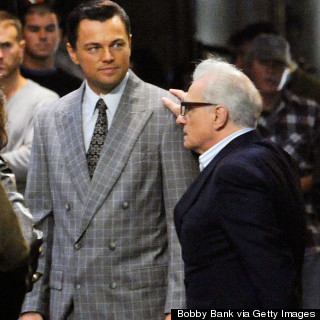
Leonardo DiCaprio plays a magnificent Jordan Belfort
What is the measure of success in America? Is there any answer beyond the cheap and easy one of money? I guess that depends on who you ask.
Skulking across the East River from the back alleys of Bayside, Queens, into the financial district's Land of Oz, comes The Wolf of Wall Street, a larger-than-life story based on the memoir of the very real Jordan Belfort. A talented shyster who made millions trading penny stocks, he was the ultimate salesman whose parasitic practices finally landed him in jail. On his release, this master of spin took up where he left off, writing a memoir of his exploits. Is there any reason to doubt him?
Directed by Martin Scorsese, life-long observer and portrait artist of New York's underbelly, this cinematic extravaganza paints the picture of Mr. Belfort in all his glory. Played magnificently by Leonardo DiCaprio, who softens Belfort's ruthless ambition with a boyish charm, he becomes almost likable.
Belfort's introduction to the brokerage world comes from his first boss, played by Matthew McConaughey. In a brilliant cameo performance, he schools his fledgling in the trade: "We make nothing -- it's all air. Name of the game? Move the money from your client's pocket into your pocket."
When Belfort discovers the penny stock market and its hefty fifty percent commission, he knows he's got a winner if he can get high enough volume. But that's no problem since, as Belfort says, everyone wants to get rich. With his blue collar targets -- postmen, garage mechanics -- it's just a matter of the right sales pitch. And Belfort has the magic touch -- a gift for persuasion and a rabble-rouser's ability to stoke up his staff, urging them never to hang up the phone until they're made the sale.
Belfort expands his company, surrounding himself with an entourage of lackeys (losers, as he calls them), a group who is happy to join his merry band of pranksters, given their off-hours (and sometimes on-hours) steady stream of booze, drugs and an array of remarkably pliable prostitutes. The debauchery offers something for everyone.
Jonah Hill plays Donnie Azoff, a dorky kind of guy who finds his niche tucked under Belfort's wing. His greatest asset, in addition to street smarts, is loyalty to Belfort, the only quality this inventive cast of characters share -- at least, while they're golden.
Belfort constructs a company universe in which they're beyond the law, beholden to no one, not the FBI, not the SEC. In a cheerful voiceover he comments: "The real question -- was all this legal? Absolutely not." When a court subpoena arrives, Donnie tosses it in a trashcan and douses it with a stream of urine.
With a strong screenplay by Terence Winter (The Sopranos), some of the scenes are beautifully turned, such as when Belfort invites FBI Agent Denham (Kyle Chandler) to his yacht. From initial deference and generous hospitality (complete with bikini-clad blondes), Belfort morphs into a brat when his attempt to bribe Agent Denhem fails. He throws lobsters at Denham as he walks away on the dock, "because you can't afford them."
Margot Robbie plays the trophy wife, Naomi Lapaglia (Belfort having dumped the home-town honey), with a convincing authenticity. But she seems merely an extension of the rest of the women here, a cast of females whose social evolution dates to about 1955. With the exception of the older Aunt Emma (Joan Lumley), none of these women seem to exist beyond their flawless exteriors. Oh, excuse me, there is Kimmie Belzer (Stephanie Kurtzuba), whom Belfort claims to have saved from her single-mom desperation, giving her a job and $25,000 to cover her rent when he hired her. Really? The Wolf of Wall Street as white-knight benefactor? Isn't that what Bernie Madoff claimed?
Belfort's life is an exercise in multi-layered pretense, from his business to his personal life, a concocted identity of how he wants to be perceived. If only he could have been a little less tacky. For instance, the name of his company: Stratton Oakmont. Seriously? Did he get that from the online site, Suburban Development Name Generator, which announces on its home page: "advanced naming features will yield even more creative names, such as The Knolls and Stoneybrooke, but your clientelle [sic] probably won't know the difference anyway."
And therein lies the rub of this movie -- it seems too many people don't know the difference anyway. The film's opening has elicited much online discussion about whether the world it portrays is intended to be admonished or admired. Given the extended vistas of exploitative practices and Bacchanalian indulgence, depending on your inclinations, it may or may not be a life to revere. With Peeping Tom footage of excessive behavior -- cavorting with hookers on a bed bouncing with greenbacks -- the film plays to both audiences.
The depiction of the world of The Wolf of Wall Street is ambiguous -- Belfort is conniving and opportunistic, yes, but he's also charming and humorous. And that's plausible for the character, but what's missing is the moral compass of a film like John Huston's classic, The Treasure of the Sierra Madre, whose futile quest for gold sacrifices everything else in the process, or the 1959 Room at the Top, in which the emptiness of the wasteland the protagonist arrives at is clear. What exactly does Mr. Scorsese intend?
True to form, Mr. Belfort appears to have weaseled his way right on to the set. In the fine print of the actor credits, Jordan Belfort is listed as the Auckland Straight Line Host, a bit part from one of the final scenes. On IMDB, he is listed as a "producer and actor." My my. But this is Hollywood, right, where role-playing performances are the stock in trade? What better opportunity for a bred-in-the-bone pretender to rise again like a phoenix from the ashes? Who knows -- maybe he'll find his penny stock audience.